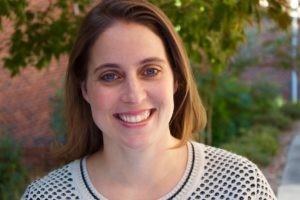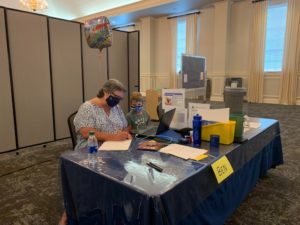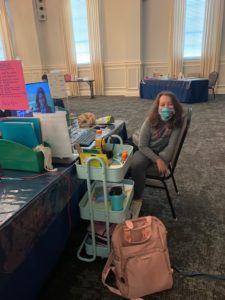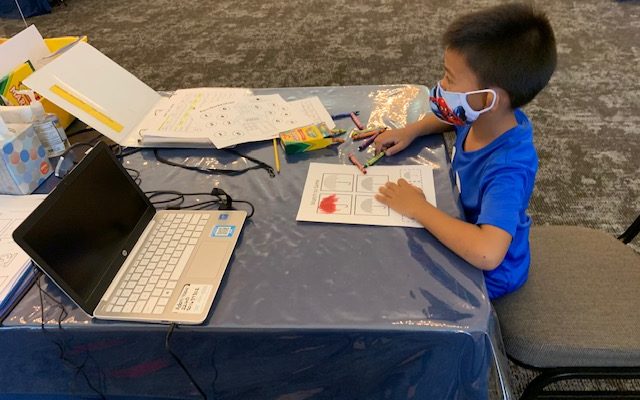It took Smoke Rise Baptist Church’s Rebecca Caswell-Speight less than two weeks to organize and open a space for more than two dozen public school children to participate in virtual learning while their parents are at work.

Rebecca Caswell-Speight
Among other tasks, she scoured articles on coronavirus infection patterns, studied how to arrange space to minimize the spread of COVID-19 and ensured the Stone Mountain, Ga., church had the bandwidth needed to support multiple computers running video Zoom conferences.
“Those were a lot of long, hard days. After we got it up and running, I took a vacation,” said Caswell-Speight, minister for families, faith formation and connection at Smoke Rise.
Now the operation is running so smoothly that National Public Radio included her and the church in a recent segment about religious communities offering distance learning space to children in their communities.
The report noted that for many houses of worship, this approach fits not only their empty buildings but also their mission.
Caswell-Speight spoke with BNG about the experience and its impact on the children and on the church.
How did NPR find you?
I am in a ministry group on Facebook and in a group for churches that have created learning pods and are serving the community in that way. They (NPR) put out a message for churches who were engaged in this ministry.
Learning pods?
That’s one of the terms for them. We call ours the Digital Learning Center. Basically, it’s a small group of students who study together here in order to lessen the chances of contracting the coronavirus. And it helps parents who cannot be home to help their kids with distance learning during the day.

A student and teacher in Smoke Rise Baptist’s Digital Learning Center. (Photos/Rebecca Caswell-Speight)
What age groups do you host at the center?
We originally said we wanted to have it be kindergarten through eighth grade. Then we had first through eighth grade and now we have wound up with kindergarten through sixth grade. It’s always changing. We have them divided into two pods.
Did the church need school district approval to do this?
We did not. As long as they are logging in, the schools are not worried.
Where is the Digital Learning Center?
We have it in our Fellowship Hall because everything we have studied and learned about preventing the coronavirus says it’s all about having a good ventilation system. Our fellowship hall is one of the largest rooms in the church and gives us the best ventilation.
What hours is it in operation?
Monday through Friday during school hours. But it also varies because each school runs on a different schedule. On Monday and Wednesday, we have one student in middle school; his hours are 9:15 to 4. Whereas, we have some students whose school day runs 8:15 to 2:45. We cover them all.
How is the space arranged in the center?
The students are at desks. We have computers here for them that different people have donated. Or kids can bring their own devices. And we have Plexiglas in the center of all our tables so we can put two students at each desk.
Does the church feed the students?
They bring their own lunches and stay distanced from each other when they are eating lunch. We provide each student a small box with school supplies.

The Digital Learning Center currently serves K-middle school students.
How many students are attending?
We had a full house of 16 at the beginning but as some of the schools have started phasing in the return to campus, we have gone to 12.
Are parents charged to have their kids there?
At the beginning of the pandemic we quickly noticed that (private) learning centers were popping up that cost $600 to $800 a month. When you think of families who have not budgeted $600 to $800 a month, you can imagine what kind of impact that would be on a family. So, we went to our Missions Committee and they agreed to pay half the cost and we charge the families $120 per month.
Is there a waiting list?
There was. It filled up the first day. And right now, I have four or five people who have been calling. It is a constantly fluid situation.
What has your role been in the learning center?
I was the main force making it happen, and I helped find the retired teachers who could support it and run it. I have checked in with them every single day since it’s been up and running. I take the checks. I make sure the teachers get paid. I created the handbook. And our head custodian helped set up the space. He was a massive force in making it happen.
How does the technology work in the center?
The church already had new Wi-Fi drops installed, so we were able to host 16 different computers running video at the same time and it didn’t shut anything down. We also bought some mobile hot spots just in case, and those sit on our teachers’ desks. They are good to have because the Smoke Rise area is notorious for electricity going out for no reason.
You mentioned teachers. How are they involved with the students?
We have teachers who stay from open to close, and we have one helper, a church volunteer. One of our teachers is there for the heaviest part of the day, which tends to be the mornings when most of the Zoom calls are going on. And we have an array of church volunteers. We asked them to make one-week commitments to cut down on traffic, which cuts down on contact tracing. We are pretty strict about it. We have signs throughout the hallways that say don’t go beyond this point during these hours. There are also signs at the entrance of the Fellowship Hall.
We also have a private school that meets downstairs and a preschool in another part of the building. None of them share the same heating and cooling systems. They all have their own entrances and exits. The only space they share is the playground but never at the same time, and it gets wiped down after each group.
Do you do temperature checks?
We do. In the learning center they get their temperature checked every day, and it is recorded.
Where did you go for expertise or guidance in making all these arrangements?
A lot of it was from reading. I spent a whole lot of time with articles by the CDC. We have some church members connected with CDC, so that helped. And we have a Risk Management Committee. We were able to go to them to share all our thoughts.
Are there lessons in all of this for the church itself?
It might still be too early to know that. We have different entrances for each of our schools in the building. And that’s how we’re going to be doing Sunday school and worship when we return. We now have proven procedures for temperature checks, and our entrance and exit (disinfection) stations are all set up the same. We have extra masks at every station in case someone shows up accidentally without a mask on campus.
How does the center fit into your calling to be a minister?
For me, this is about filling a need. One of the things we talked about in setting up the Digital Learning Center was using it to teach our faith and our faith stories. We have a Muslim student and a student without a specific faith, so we are practicing our faith in this case by doing. We are being the hands and feet (of Christ). For me, that’s what Jesus called us to do, which is to look for the needs of our community and find ways to fill them. And that’s the kind of church Smoke Rise is.


